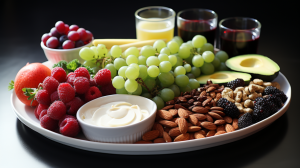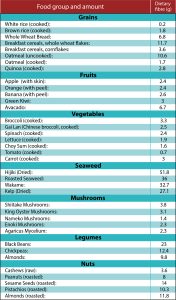Fucoidan Health News October: Eating Fiber to Manage Constipation


Eating Fiber to Manage Constipation
In the face of life and work stress, many seek comfort in “eating”. Regularly dining out, skimping on fruits and vegetables, and leading a sedentary lifestyle can often result in digestive issues like constipation. Adequate dietary fiber and water intake can promote intestinal motility and facilitate smooth bowel movements. In this month’s health news, we delve into the world of dietary fiber, exploring its benefits, daily intake recommendations, and foods rich in dietary fiber. If you wish to alleviate constipation or improve your gut health, read on for some valuable insights:
What is Dietary Fiber?

What Is Dietary Fiber?
Dietary fiber belongs to the carbohydrate family, and the human body does not absorb it. It comes in two main forms: soluble fiber (dissolves in water) and insoluble fiber (does not dissolve in water). Each type offers distinct benefits for our digestive health.
Key Food Sources:
♦︎ Soluble Fiber: Found in legumes, wheat bran, fruits, and seaweed. Mozuku and Mekabu are examples of soluble fiber that we can easily incorporate into our daily diet. Try adding them to your salads or miso soup. Soluble fiber aids in supporting digestive processes.
♦︎ Insoluble Fiber: Found in whole grains and vegetables. It remains undigested as it travels through the digestive system, adding bulk to stool and encouraging bowel movements. As a result, it promotes active and smoother bowel function.
How Much Fiber Do You Need Daily?
The recommended daily dietary fiber intake is between 25 and 35 grams for adults and teenagers. Unfortunately, most people fail to meet this standard in their daily diet. To ensure you’re getting enough fiber, it’s advisable to include 1-2 servings of vegetables and 2-3 servings of fruits in your daily meals. Eating fiber-rich foods can also help you meet the recommended intake more easily. Here’s a list of foods and their dietary fiber content per 100 grams:

Can Umi No Shizuku Fucoidan Help with Constipation?
Umi No Shizuku Fucoidan is a dietary supplement made from Mozuku, Mekabu, and Agaricus Mycelium. Fucoidan is a water-soluble dietary fiber that undergoes breakdown by intestinal bacteria in the gut, producing “short-chain fatty acids (SCFAs)”. SCFAs include molecules like acetic acid and propionic acid, which serve as the primary nutrient source for colon cells. They also help balance the expression of inflammatory cytokines and immunomodulators in the body. Furthermore, Fucoidan contributes to supporting the immune system and maintaining overall health. Therefore, taking Umi No Shizuku Fucoidan capsules daily can support healthy digestive system function and smooth bowel movements. It’s also essential to remember to combine this with a balanced diet and regular exercise for optimal results.
The Relationship Between Fiber and Hydration Consuming an Abundance of High-Fiber Veggies but Still Dealing with Constipation?
Inadequate Hydration Could Be the Cause! If you suffer from constipation, try incorporating fiber-rich foods into your daily diet and ensure you drink enough water; otherwise, the effects may be counterproductive. Consuming a significant amount of fiber without adequate water intake can lead to dry and hard stools; fiber may also easily adhere to the intestinal walls, making it difficult to pass. Additionally, constipation can have various underlying causes beyond inadequate water intake or low consumption of fruits and vegetables. It may also indicate an underlying medical condition, underscoring the importance of regular health check-ups.
Reference:
https://consumer.fda.gov.tw/Food/TFND.aspx?nodeID=178
https://www.studenthealth.gov.hk/english/health/health_dn/health_dn_dfayb.html
https://fooddb.mext.go.jp/index.pl

